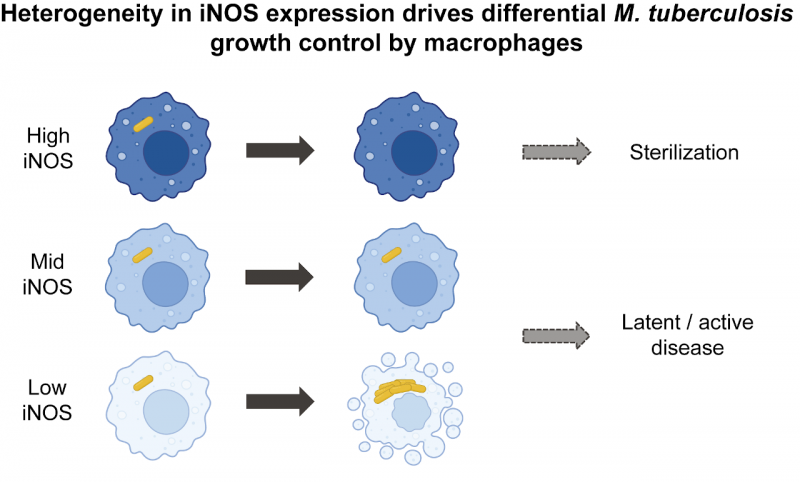2023 Swiss TB Award
The SwissTB award has been given this year to Dr Ophélie Rutschmann.
 Mycobacterium Tuberculosis (Mtb) is a highly effective pathogen infecting nearly a third of the world’s population. Part of its success comes from its ability to survive and replicate inside macrophages, cells that are usually charged with repressing bacterial infections. The interactions between Mtb and macrophages are heterogeneous and can lead to diverse outcomes, ranging from the death of the pathogen to its replication and subsequent killing of the host cell. The origins of this heterogeneity are not well characterized, and we strive to understand how diversity in the bacteria and the host populations can influence the outcome of an infection.
Mycobacterium Tuberculosis (Mtb) is a highly effective pathogen infecting nearly a third of the world’s population. Part of its success comes from its ability to survive and replicate inside macrophages, cells that are usually charged with repressing bacterial infections. The interactions between Mtb and macrophages are heterogeneous and can lead to diverse outcomes, ranging from the death of the pathogen to its replication and subsequent killing of the host cell. The origins of this heterogeneity are not well characterized, and we strive to understand how diversity in the bacteria and the host populations can influence the outcome of an infection.
In this study, published in the scientific journal mBio, we followed single live macrophages infected with strains of Mtb expressing different fluorescent proteins over the course of several days. We observed that the rate of intracellular bacterial growth varies markedly between individual macrophages, suggesting that some cells are more permissive to bacterial growth than others. We further showed that this inter-macrophage heterogeneity is driven by cell-to-cell variation of inducible nitric oxide synthase (iNOS) expression, a known defense mechanism against intracellular pathogens such as Mtb. Interestingly, iNOS expression fluctuates over time in single cells, independent of infection with Mtb or activation with interferon gamma.

As alveolar macrophages are often the first cells to encounter Mtb, studying how they interact with this pathogen is essential to understand the early stages of the infection. In our study, we demonstrated that fluctuations in the expression of even a single antimicrobial gene, such as iNOS, can define how well a macrophage can control an Mtb infection. These results are especially relevant for diseases such as tuberculosis, since an infection can start with a single bacterium encountering a single host macrophage. Thus, the level of iNOS expressed by this macrophage could lead to diverse infection outcomes, which could shed light on why some exposed individuals are able to clear the infection while others develop progressive disease.
